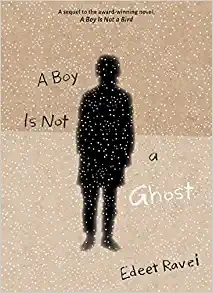A Boy Is Not a Ghost
Genre: fiction | historical | middle grade | survival | war

Author: Edeet Ravel
Publisher: Groundwood Books
[widget id="post-tags-widget-2"]
In this sequel to the award-winning A Boy Is Not a Bird, a boy is exiled to Siberia during World War II. Based on a true story.
Torn from his home in Eastern Europe, with his father imprisoned in a Siberian gulag, 12-year-old Natt finds himself stranded with other deportees in a schoolyard in Novosibirsk. And he is about to discover that life can indeed get worse than the horrific two months he and his mother have spent being transported on a bug-infested livestock train. He needs to write to his best friend, Max, but he knows the Soviet police read everyone’s mail. So Natt decides to write in code, and his letters are a lifeline, even though he never knows whether Max will receive them.
Every day becomes a question of survival, and where they might be shunted to next. When his mother is falsely arrested for stealing potatoes, Natt is truly on his own and must learn how to live the uncertain life of an exile: Practice being invisible as a ghost, change your name and identity if you have to, watch out for spies and never draw the attention of the authorities.
Even then, he will need luck on his side if he is ever going to be reunited with his family.
Based on real events, the story begins with 12-year-old Natt and his mother en route to Siberia following the arrest of his father by a Stalinist government in Eastern Europe during World War II. Natt bemoans the horrific conditions aboard the cattle car that takes him farther away from his home—overcrowding, starvation, bug infestation—only to learn that things can indeed get worse instead of better. A stay in a refugee camp, a long journey aboard a barge and hard labour during the Siberian winter are followed by the arrest of his mother and a series of temporary homes with strangers with little food or comfort. Natt learns to communicate through letters with his friend Max and his mother by using code so as not to be intercepted by Stalinist police officers keen on meeting their quotas. He quickly learns that in order to survive, he must, more and more, become like a ghost.
The book describes vividly the horrors of forced migration in a totalitarian regime rife with bribery and driven by fear. During one of his many migrations, now separated from both parents, Natt reflects on his fate: “I stare at the passing trees in a daze. I’m starting to feel like a ghostly spirit, drifting from place to place. Every day I’m becoming more invisible and less solid.”
But between the monotony of hard labour, hunger and despair, Natt finds moments of warmth and friendship and even laughter. After a secret (and illegal) Hanukkah party, for example, he finds himself remembering a time before the war, a time of family and happiness, and decides that “remembering is both the best thing and the worst thing, but that you have to remember. If you don’t remember, you really are a ghost.”
Ravel expertly does precisely that: helps us to remember, not only the horrific conditions that people like Natt had to live through, but the importance of moments of fellowship and kindness, even in the least likely places. Ironically, Natt at one point comments on how “Stalin forces us all to be such good storytellers” by the many name changes and lies required to pass through Stalin’s police force to find his way home. It is ironic because the real-life experiences that this story is based on also made it possible for Ravel to tell a story that is so compelling and that encourages us to always look for hope, even when it seems so far away.
The book is appropriate for ages 8 and up. It includes a historical background with maps and illustrations.
- James Steeves
no-repeat;left top;; auto
